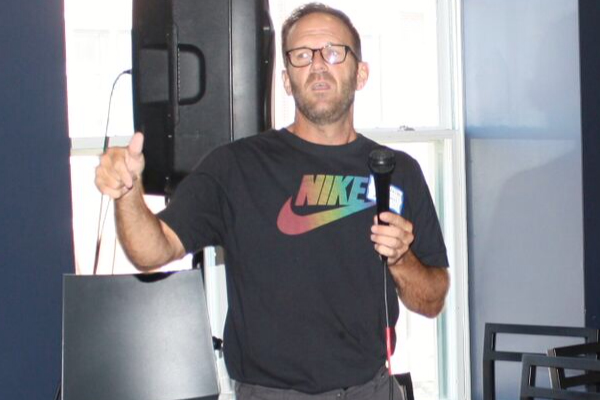Sports
UCLA coach Kirk Walker on life after coming out
‘Your team is a family, and I needed to be true to my family’

Kirk Walker officially became the ‘gay’ Division I softball coach back in 2005 when he came out to his team at Oregon State. The press coverage followed with headlines that declared he was the first publicly out coach in the NCAA. Despite courageously sharing his story, Walker wasn’t completely comfortable with the new title.
“I didn’t want to be labeled the gay coach,” he admits. “But then I said that’s fine. I realized it needed to be said, that we needed to have some visibility. I decided to stop fighting it.”
Like his life, Walker’s role is one that keeps evolving. It has been shaped by the sports environment he works in, the confidence he continues to gain from the process of coming out and his morals. When he finally embraced who he was, he found it directly conflicted with his personal coaching philosophy. That was his motivating factor for coming out.
“I had been feeling for years like I was sending the wrong message,” says Walker, who has been an assistant coach at UCLA since returning in 2012. “As a coach you tell your athletes to have integrity and to be authentic. How could I ask that of them when I wasn’t setting that example? Your team is a family, and I needed to be true to my family. That was his motivating factor for coming out.”
Walker’s experience resonated with many, and after sharing his story, his inbox was flooded. When Rick Welts, a longtime NBA executive, decided to come out, Walker reached out to show his support. The response he got from Welts still inspires him to this day.
“I got an email from him that said, ‘I carried your story around with me before I decided to tell mine.’” He applauds the significance of sharing. “Your story can affect somebody.”
That small interaction was a big factor in leading Walker to enter the advocacy stage of his life, and he has been loaning his support to several LGBT sports initiatives for years. Nationally he has been involved since 2012 with the Nike LGBT Sports Coalition, speaking at the annual summit held in Portland, Ore.
“I have a great passion for LGBT advocacy,” says Walker, whose demeanor is both measured and charged with purpose. “There’s so much more to be done around education, bullying and diversity in sports. I hope to be able to do this full time when I retire from coaching. I look forward to any opportunity to be involved.”
Walker’s diversity and inclusion vision includes work with his foundation. Equality Coaching Alliance and the LGBT Sports Coalition both provide confidential support and counseling to hundreds of athletes. While the younger generation can benefit from more visible role models, something Walker did not have, he thinks their views on coming out or why they stay closeted are very different from in the past.
“They don’t really see coming out as being all that imperative and don’t even like labeling themselves as gay or straight,” he says. “There are many in this generation that are comfortable existing as they are, without making statements.”
Counseling and connecting high school, college and professional LGBT athletes is a major part of the advocacy work that Walker does. And he has seen throughout the years, that building a network of support creates an environment where athletes can see they are not alone, and can feel strong enough to choose to come out or not.
But Walker acknowledges there are fears around the process, and feels that the same pressures exist today.
“The perception that sports is inherently homophobic still keeps many coaches, athletes, and individuals from coming out,” he says. “You never have to come out when you are straight, it is assumed. Even in an accepting environment your sexuality will always be assumed straight because it is a huge majority of how society identifies itself.”
In his view, one of the most impactful detriments to not coming out is the amount of time and effort put into trying to be someone else.
“Every second that an athlete or a coach spends on pretending is wasted energy,” says Walker. He lived that lie for years, he says and it was exhausting. “Why does it matter whether you come out or not? Because it frees you up and allows you to focus on competing and being an athlete. It lets them uncap their athletic potential. What coach wouldn’t want that? What athlete wouldn’t?”
Promoting diversity, building awareness and helping create opportunities for LGBT athletes around the country fills up Walker’s days as much as devising strategies for his softball players. Along with the spotlight, he welcomes the titles.
“The stories we’ve seen in the last six or seven years have been powerful,” Walker says. “I think it will continue to be the headline of the story for a while. But it doesn’t have the same gravitas as before. We have to move on, to where it becomes the second part of the story. I think we will get there.”
Sports
Attitude! French ice dancers nail ‘Vogue’ routine
Cizeron and Fournier Beaudry strike a pose in memorable Olympics performance

Madonna’s presence is being felt at the Olympic Games in Italy.
Guillaume Cizeron and his rhythm ice dancing partner Laurence Fournier Beaudry of France performed a flawless skate to Madonna’s “Vogue” and “Rescue Me” on Monday.
The duo scored an impressive 90.18 for their effort, the best score of the night.
“We’ve been working hard the whole season to get over 90, so it was nice to see the score on the screen,” Fournier Beaudry told Olympics.com. “But first of all, just coming out off the ice, we were very happy about what we delivered and the pleasure we had out there. With the energy of the crowd, it was really amazing.”
Watch the routine on YouTube here.
Italy
Olympics Pride House ‘really important for the community’
Italy lags behind other European countries in terms of LGBTQ rights

The four Italian advocacy groups behind the Milan Cortina Winter Olympics’ Pride House hope to use the games to highlight the lack of LGBTQ rights in their country.
Arcigay, CIG Arcigay Milano, Milano Pride, and Pride Sport Milano organized the Pride House that is located in Milan’s MEET Digital Culture Center. The Washington Blade on Feb. 5 interviewed Pride House Project Manager Joseph Naklé.
Naklé in 2020 founded Peacox Basket Milano, Italy’s only LGBTQ basketball team. He also carried the Olympic torch through Milan shortly before he spoke with the Blade. (“Heated Rivalry” stars Hudson Williams and Connor Storrie last month participated in the torch relay in Feltre, a town in Italy’s Veneto region.)
Naklé said the promotion of LGBTQ rights in Italy is “actually our main objective.”
ILGA-Europe in its Rainbow Map 2025 notes same-sex couples lack full marriage rights in Italy, and the country’s hate crimes law does not include sexual orientation or gender identity. Italy does ban discrimination based on sexual orientation in employment, but the country’s nondiscrimination laws do not include gender identity.
ILGA-Europe has made the following recommendations “in order to improve the legal and policy situation of LGBTI people in Italy.”
• Marriage equality for same-sex couples
• Depathologization of trans identities
• Automatic co-parent recognition available for all couples
“We are not really known to be the most openly LGBT-friendly country,” Naklé told the Blade. “That’s why it (Pride House) was really important for the community.”
“We want to use the Olympic games — because there is a big media attention — and we want to use this media attention to raise the voice,” he added.

Naklé noted Pride House will host “talks and roundtables every night” during the games that will focus on a variety of topics that include transgender and nonbinary people in sports and AI. Another will focus on what Naklé described to the Blade as “the importance of political movements now to fight for our rights, especially in places such as Italy or the U.S. where we are going backwards, and not forwards.”
Seven LGBTQ Olympians — Italian swimmer Alex Di Giorgio, Canadian ice dancers Paul Poirier and Kaitlyn Weaver, Canadian figure skater Eric Radford, Spanish figure skater Javier Raya, Scottish ice dancer Lewis Gibson, and Irish field hockey and cricket player Nikki Symmons — are scheduled to participate in Pride House’s Out and Proud event on Feb. 14.
Pride House Los Angeles – West Hollywood representatives are expected to speak at Pride House on Feb. 21.
The event will include a screening of Mariano Furlani’s documentary about Pride House and LGBTQ inclusion in sports. The MiX International LGBTQ+ Film and Queer Culture Festival will screen later this year in Milan. Pride House Los Angeles – West Hollywood is also planning to show the film during the 2028 Summer Olympics.
Naklé also noted Pride House has launched an initiative that allows LGBTQ sports teams to partner with teams whose members are either migrants from African and Islamic countries or people with disabilities.
“The objective is to show that sports is the bridge between these communities,” he said.
Bisexual US skier wins gold
Naklé spoke with the Blade a day before the games opened. The Milan Cortina Winter Olympics will close on Feb. 22.
More than 40 openly LGBTQ athletes are competing in the games.
Breezy Johnson, an American alpine skier who identifies as bisexual, on Sunday won a gold medal in the women’s downhill. Amber Glenn, who identifies as bisexual and pansexual, on the same day helped the U.S. win a gold medal in team figure skating.
Glenn said she received threats on social media after she told reporters during a pre-Olympics press conference that LGBTQ Americans are having a “hard time” with the Trump-Vance administration in the White House. The Associated Press notes Glenn wore a Pride pin on her jacket during Sunday’s medal ceremony.
“I was disappointed because I’ve never had so many people wish me harm before, just for being me and speaking about being decent — human rights and decency,” said Glenn, according to the AP. “So that was really disappointing, and I do think it kind of lowered that excitement for this.”
Puerto Rico
Bad Bunny shares Super Bowl stage with Ricky Martin, Lady Gaga
Puerto Rican activist celebrates half time show

Bad Bunny on Sunday shared the stage with Ricky Martin and Lady Gaga at the Super Bowl halftime show in Santa Clara, Calif.
Martin came out as gay in 2010. Gaga, who headlined the 2017 Super Bowl halftime show, is bisexual. Bad Bunny has championed LGBTQ rights in his native Puerto Rico and elsewhere.
“Not only was a sophisticated political statement, but it was a celebration of who we are as Puerto Ricans,” Pedro Julio Serrano, president of the LGBTQ+ Federation of Puerto Rico, told the Washington Blade on Monday. “That includes us as LGBTQ+ people by including a ground-breaking superstar and legend, Ricky Martin singing an anti-colonial anthem and showcasing Young Miko, an up-and-coming star at La Casita. And, of course, having queer icon Lady Gaga sing salsa was the cherry on the top.”
La Casita is a house that Bad Bunny included in his residency in San Juan, the Puerto Rican capital, last year. He recreated it during the halftime show.
“His performance brought us together as Puerto Ricans, as Latin Americans, as Americans (from the Americas) and as human beings,” said Serrano. “He embraced his own words by showcasing, through his performance, that the ‘only thing more powerful than hate is love.’”





















